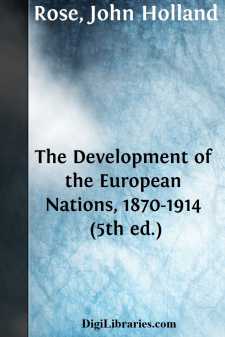History
- Africa 30
- Americas (North Central South West Indies) 50
- Ancient 68
- Asia 58
- Australia & New Zealand 8
- Canada 41
- Caribbean & West Indies 1
- Civilization 20
- Eastern Europe 12
- Europe 310
- Expeditions & Discoveries 60
- General 77
- Historical Geography 1
- Jewish 9
- Latin America 3
- Medieval 8
- Middle East 13
- Military 248
- Revolutionary 8
- Study & Teaching 5
- United States 353
- Western Europe 56
- World 13
History Books
Sort by:
by:
Emma Helen Blair
Letter from Peñalosa to Felipe II Royal Catholic Majesty: There has now returned one of the ships by which I wrote in the year 80. Until now no word has been received of the other ship to Nueva España, in which I sent a duplicate report. Therefore in this letter I shall refer to some of the most essential points which I had written, and will give a report also of what is presented for the first time....
more...
by:
John Fiske
BIOGRAPHICAL SKETCH. To relate, by way of leading up to this little book, all the previous achievements of its author would—without disrespect to the greater or the less—have somewhat the appearance of putting a very big cart in front of a pony. But no idea could be more mistaken than that which induces people to believe a small book the easiest to write. Easy reading is hard writing; and a...
more...
The object of a census is scientific. A census is a sociological investigation. And the object of the science of sociology is the happiness of the people. This science and its methods differ sharply from all other sciences. Its peculiarity lies in this, that sociological investigations are not conducted by learned men in their cabinets, observatories and laboratories, but by two thousand people...
more...
CHAPTER EARLY EXPLOITS UPON THE WATER. — GALLOP'S BATTLE WITH THE INDIANS. — BUCCANEERS AND PIRATES. — MORGAN AND BLACKBEARD. — KIDD TURNS PIRATE. — DOWNFALL OF THE BUCCANEERS' POWER. n May, 1636, a stanch little sloop of some twenty tons was standing along Long Island Sound on a trading expedition. At her helm stood John Gallop, a sturdy colonist, and a skilful seaman, who earned...
more...
CHAPTER I THE CAUSES OF THE FRANCO-GERMAN WAR"After the fatal year 1866, the Empire was in a state of decadence."--L. GREGOIRE,Histoire de France. The irony of history is nowhere more manifest than in the curious destiny which called a Napoleon III. to the place once occupied by Napoleon I., and at the very time when the national movements, unwittingly called to vigorous life by the great...
more...
by:
Mahatma Gandhi
THIRD CLASS IN INDIAN RAILWAYS I have now been in India for over two years and a half after my return from South Africa. Over one quarter of that time I have passed on the Indian trains travelling third class by choice. I have travelled up north as far as Lahore, down south up to Tranquebar, and from Karachi to Calcutta. Having resorted to third class travelling, among other reasons, for the purpose of...
more...
by:
John Leacock
JOHN LEACOCK Among the elusive figures of early American Drama stands John Leacock, author of "The Fall of British Tyranny," published in 1776, in Philadelphia. Even more elusive is the identification, inasmuch as his name has been spelled variously Leacock, Lacock, and Laycock. To add to the confusion, Watson's "Annals of Philadelphia," on the reminiscent word of an old resident...
more...
EMANCIPATION UNDER THE WAR POWER. Extracts from the speech of John Quincy Adams, delivered in the U.S.House of Representatives, April 14 and 15, 1842, on War with GreatBritain and Mexico:— What I say is involuntary, because the subject has been brought into the House from another quarter, as the gentleman himself admits. I would leave that institution to the exclusive consideration and management of...
more...
PREFACE In the former volume, entitled "William Pitt and National Revival," I sought to trace the career of Pitt the Younger up to the year 1791. Until then he was occupied almost entirely with attempts to repair the evils arising out of the old order of things. Retrenchment and Reform were his first watchwords; and though in the year 1785 he failed in his efforts to renovate the life of...
more...
I. THE PROLOGUE. 1. Nennius, the lowly minister and servant of the servants of God, by the grace of God, disciple of St. Elbotus,* to all the followers of truth sendeth health. * Or Elvod, bishop of Bangor, A.D. 755, who first adopted inthe Cambrian church the new cycle for regulating Easter. Be it known to your charity, that being dull in intellect and rude of speech, I have presumed to deliver these...
more...











